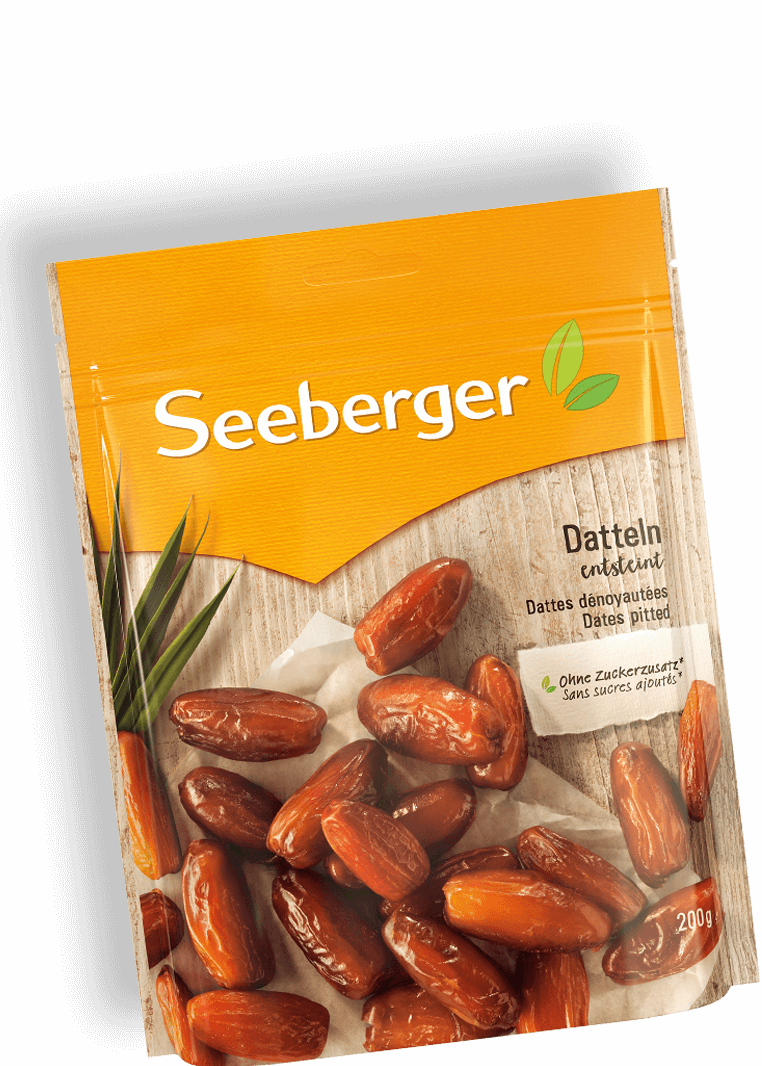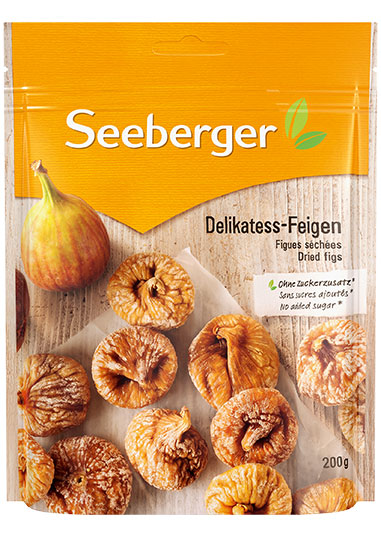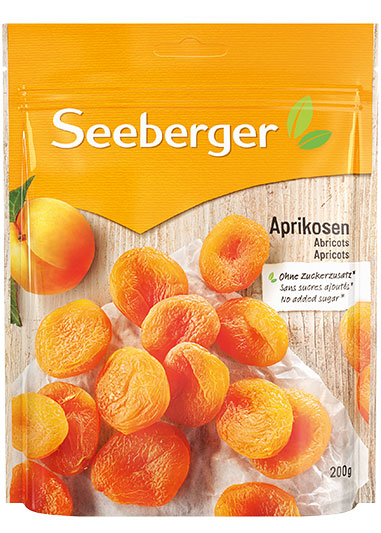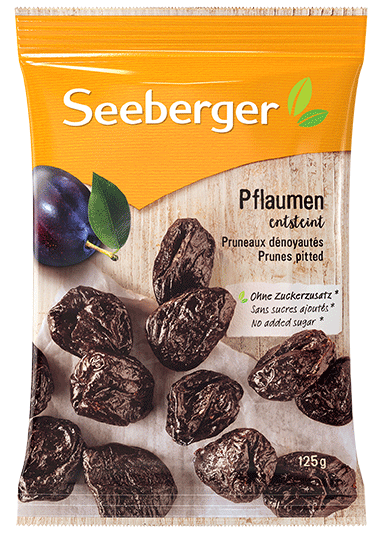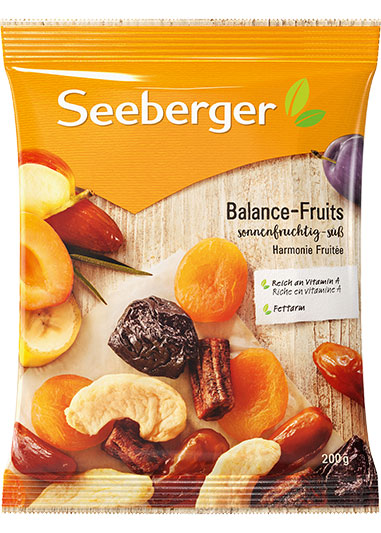Dates Pitted
Product information
Golden sand dunes, blue skies and a slight breeze... our honey-sweet dates, which ripen into juicy fruits on high date palms, remind you what holiday feels like. The gleaming fruits from the desert regions of North Africa allow you to revel in your thoughts and indulge with their exotic, caramel-like aroma. Free of preservatives, pitted and with no added sugar, they provide an ideal source of power and energy, allowing you to leave everyday life behind.
Ingredients
Dates
Nutrition Statement
No added sugar (contains natural sugar), rich in fibre, source of potassium
This product is
- vegetarian
- vegan
- glutenfree*
- lactosefree*
- no added sugar**
- no added salt***
Nutrition facts
(per 100g)
- Calories (kj/kcal) 1.253 kj/296 kcal
- Fat 0,5 g
- of which saturated fatty acids 0,1 g
- Carbohydrate 66 g
- of which sugar ** 65 g
- Protein 1,9 g
- Salt *** 0,09 g
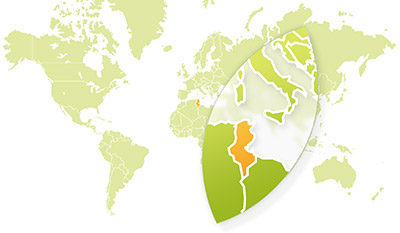
COUNTRY OF ORIGIN: TUNISIA
The journey of our Seeberger dates starts out in sunny Tunisia. Tunisia is named after the capital, Tunis, in the north of the country. It is from this North African state that we source most of our honey-sweet dates. The juicy fruits grow on date palms in the south of the country, where they can be found, for example, at the oases around the large salt lake of Chott el Djerid. The first short journey of the fresh dates takes them from there to the north of Tunisia, where the fruits are processed further.
GROWING THE DATES
The huge date palms grow in the oases in the hot and barren deserts of southern Tunisia. Here, palms and other plants with long roots reach the groundwater at depth, which enables them to survive and thrive. The palm trees are pollinated entirely invisibly by pollen that drifts in on the hot desert air. To speed up the natural process a little, the Tunisian farmers lend a helping hand by hanging the branches of the male palms in the branches of the female palms, which then later bear the fruit.
DATE PALMS – GIANTS IN THE DESERT
Did you know that date palms can grow up to 30 meters high – higher than the Brandenburg Gate in Berlin? The first dates grow on the panicles of the giant palms only after eight years. The panicles, a natural protective shield for the fruit, keep insects from burrowing inside it and so help the sweet pulp retain its pleasantly tender consistency. To further protect the fruit from being scorched by the sun, and from rain and insects, farmers attach protective covers to the branches that carry dates. Our Seeberger dates belong to the Deglet Nour variety, or ‘date palm of light’. Held up against the sun, the contour of the date stone enclosed by the kernel resembles a finger bone.
HARVESTING THE DATES IN OCTOBER
In Tunisia, dates are harvested in October. Workers scale the tall date palms and the worker standing at the very top carefully cuts the branches that carry the fruit. These bunches are lowered down the trunk from worker to worker until they reach the ground, where they are collected for onward transport. Harvesting takes about 20–30 minutes per palm, depending on the size of the tree. After the harvesting, the dates travel to the north of the country for further processing.
PROCESSING OF THE DATES – REAL HANDWORK
Our local partner processes several thousand tons of dates every year. The first thing is to sort out the damaged and spoiled or spotted dates. Our partner also looks out for overly dry dates, to avoid possible spoilage. The fresh fruits are then washed. The next step is to moisten the dates so that they can then be pitted. Placed in small baskets, the dates pass into a chamber into which steam is blown and absorb the moisture from the high humidity. The pitting of the dates involves genuine work by hand. Each date is cut open by hand to remove the pit and at the same time inspect the date for insect damage and other problems. The dates are then dried again to a target moisture content. At the same time, the best-quality dates are selected and in the end transported to Ulm. The quality of the dates is judged by the beautiful golden brown color and a uniform size.
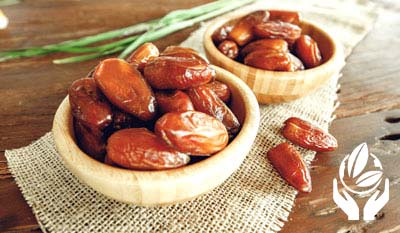
SUSTAINABILITY
The cooperation between the date farmers in the south and the processing plant in the north of Tunisia demands sustainability. The oases in the south belong to individual date farmers. Our supplier values long-term cooperation and obtains about 80% of the dates from the same farmers. The contracts are already agreed in June before the harvest. Special clauses ensure treatments such as the covers to protect against rain, sunburn and insects. In addition, the direct reference to the product also focuses on sustainability. The pits extracted from the dates, as well as the insect-damaged dates, are processed into animal feed. All of the date panicles are used, converted either to practical baskets or natural fertilizer.
PARTNER RELATIONSHIPS
Partnership and fair relationships mean a lot to us. We have been working successfully with our supplier from the north of the country for over 24 years. We maintain a friendly and trusting relationship with the family of the owner. Our purchasing manager, Christian Liebsch, was even invited as a guest to the wedding of the supplier's daughter and was there for the festivities.
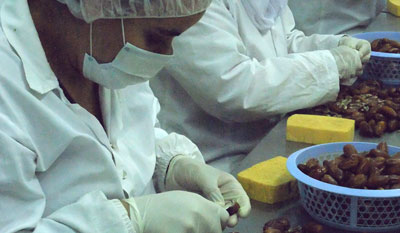
FAIR WORKING CONDITIONS
Our partner also strives for fair working conditions from the very start. The mostly female workers are picked up each morning by bus and taken together to the processing plant. After work, the bus brings the employees safely home again. In addition, the employees have unions that advocate for other issues such as wage increases.
 Dates: pitted and with no added sugar | Seeberger GmbH
Dates: pitted and with no added sugar | Seeberger GmbH
